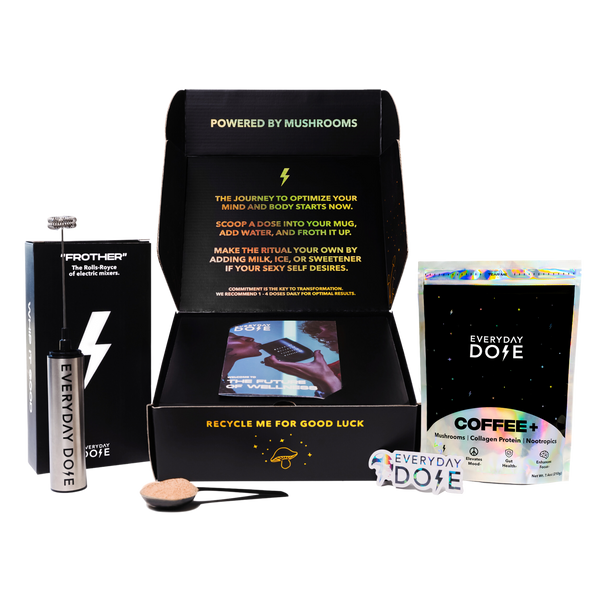L-Theanine Dose To Balance Everyday Anxiety: How Much Do You Need?

Nowadays, it feels like we’re all juggling multiple responsibilities. We try to succeed at work, keep ourselves healthy, hang out with friends, and enjoy hobbies. With only 24 hours in the day, many of us are on the go from sunup to sundown.
Unfortunately, being constantly busy can cause a significant amount of psychological stress. This is why rates of burnout have steadily risen over the years, with 79 percent of adults having experienced burnout as of 2021. One of the ways these stresses can manifest is through feelings of anxiety.
Many people look for natural ways to support their mental health as they navigate these challenges. Read on to learn more about how L-theanine can encourage feelings of relaxation and how much L-theanine you can take.
What Causes Feelings of Anxiety?
First things first — let’s identify the differences between simply feeling anxious and having anxiety.
Some feelings of anxiety tend to come and go as stresses come and go. For instance, you might feel your anxiety levels spike leading up to a work presentation. However, once the presentation is over, you should gradually start to feel more relaxed.
Anxiety, on the other hand, doesn’t go away — it sticks around even when there are no obvious stressors. In psychiatry, this is often called generalized anxiety disorder (GAD). GAD is a mental health condition that is treated with prescription medications, and it’s important to work with a healthcare provider because supplements are not designed to address anxiety symptoms.
That said, some stress-related symptoms of temporary, everyday anxiety can include:
- Sweating
- Shaking
- Feeling short of breath
- Feeling dizzy or lightheaded
- Feeling numb
- Racing heartbeat
What Is L-Theanine?
L-theanine is an amino acid that is naturally found in the Camellia sinensis plant. This plant is also known as the tea plant since its leaves are used to make black tea, green tea, white tea, and oolong tea. When ground up, these same tea leaves make matcha.
Even though tea naturally contains L-theanine (especially matcha, which is specifically grown to have high levels of L-theanine), many people take isolated L-theanine supplements. This can make it easier to get more of this amino acid without drinking tons of tea every day.
What Are the Health Benefits of L-Theanine?
Why is L-theanine so popular? Here are three main benefits of taking L-theanine.
Encourages Brain Function
First, L-theanine can support brain function. Studies show that this amino acid can help support cognitive performance, specifically when it comes to reaction times and attention. This is especially true for healthy adults who experience temporary feelings of anxiety.
L-theanine may also encourage alpha brain activity. Alpha brain waves reflect our ability to focus and relax and are an important part of overall cognitive function. This is one reason why L-theanine is known to support focused and clear thinking.
Supports Feelings of Relaxation
L-theanine can cross the blood-brain barrier, which means it can influence certain receptors that help regulate the nervous system. For instance, L-theanine can support healthy levels of dopamine, serotonin, and gamma-aminobutyric acid (GABA), which are all part of a healthy stress response.
These neurotransmitters have other functions, too. For instance, the body uses serotonin to make melatonin.
L-theanine may also help support healthy levels of cortisol, the body’s stress hormone. This may indirectly encourage a steady heart rate and healthy blood pressure levels. All of this can combine to support overall mental health.
Encourages a Good Night’s Sleep
L-theanine is structurally similar to glutamate, an amino acid that helps regulate the sleep/wake cycle. This amino acid’s influence on GABA levels can also support sleep quality and help encourage drowsiness when you need it. This is especially helpful when racing thoughts are keeping you wide awake.
Plus, getting enough sleep is important for overall wellness. Sleep is directly tied to the immune system, mental health, and even the body’s ability to heal itself.
Softens the Effects of Caffeine
Have you ever had one too many cups of coffee and noticed a jittery, anxious feeling take hold? This is one of many side effects of caffeine.
Even if you drink less than the generally recommended amount of caffeine, remember that your body has its own threshold. Your tolerance for caffeine may be much lower than you expect, and you may be experiencing unpleasant side effects of caffeine without realizing it. These could include digestive problems, heartburn, sleep disturbances, and extra stress.
Luckily, L-theanine can help soothe the effects of caffeine on the nervous system. This means that, as long as you take the two together, you can experience a general lift of energy without feeling like your nervous system is in overdrive.
How Much L-Theanine Should You Take?
Now we get to the question of the hour: How much L-theanine should you take to feel relaxed? The answer is, however much helps you to feel relaxed.
L-theanine isn’t like other dietary supplements, such as vitamin C or magnesium — there’s no nationally recognized amount of L-theanine your body must have in order to function properly. This means that it’s really up to you to see how your body responds to it and adjust your dosage accordingly.
That said, experts generally agree that adults shouldn’t take more than 500 mg of L-theanine per day. There aren’t many reported side effects of L-theanine, and most of the adverse effects only occur with crazy high doses.
If you’re not sure where to start, try using the recommended dose of L-theanine on your supplement. See how you feel afterward, and adjust your L-theanine dosage as you need to experience the beneficial effects.
There are also a few cases where you should talk to a healthcare professional before starting any new supplement, including L-theanine. For instance, if you’re breastfeeding, pregnant, or have any health conditions, it’s best to get the go-ahead from someone who knows your health history. There are currently no studies that research the effects of L-theanine consumption in these types of situations.
Also, you should talk to a doctor if you take any other medications. The combination of L-theanine and prescription medications could cause side effects.
The Final Word
L-theanine is a supplement that is getting more and more attention for its calming effects and ability to support overall well-being. Ultimately, the amount of L-theanine you should take depends on your health and how you feel.
At Everyday Dose, L-theanine is one of the key ingredients in our Mushroom Coffee+. This functional coffee also combines lion’s mane and chaga mushrooms, coffee extract, and grass-fed bovine collagen to support mental clarity. Try it today to see the mind-blowing effects for yourself.
Sources:
Burnout and Stress Are Everywhere | American Psychiatric Association
L-Theanine: A Unique Functional Amino Acid in Tea (Camellia sinensis L.) With Multiple Health Benefits and Food Applications | Front. Nutr
Women and Anxiety | Food and Drug Administration (FDA)
Effects of l-theanine on attention and reaction time response | ScienceDirect
L-theanine, a natural constituent in tea, and its effect on mental state | PMC








